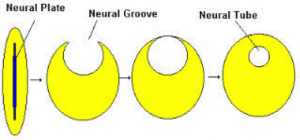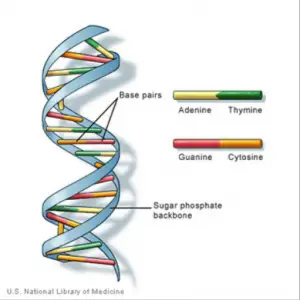Spina bifida is a birth defect that is congenital and due to defect or abnormal closure of bony parts of the vertebra during intrauterine life. It is a common neural tube defect. There are many types of spina bifida. Three types are more common: spina bifida occulta, meningocele, and myelomeningocele.

Genetics of spina bifida
Is spina bifida genetically transferred? It is a very valid question because every person who is affected by this birth defect has the same question in mind; they wonder what is the cause of the birth defect. Is there any gene problem? The answer to this question is yet not clear and is debatable. But there is definitely a link present in genetic mutation in the occurrence of this birth defect.
It is a complex situation that links to many genetic and environmental issues. Many genes are altered in individuals with spina bifida and their mothers and thus increase the risk of neural tube defect. MTHFR is a gene that is involved in the formation of protein that is used in the processing of folic acid vitamin (it is also called vitamin B9). Deficiency of this vitamin is an important cause in the development of spina bifida.

When other genes that are related to the processing of folic acid are changed due to any reason, the risk of development of neural tube defect is enhanced. SHMT1 is another gene that is found altered in the patients of spina bifida. Studies show that this gene is also involved in the folic acid metabolism. Alteration of this gene disturbs folic acid metabolism. Folic acid is decreased and chances of neural tube defect are increased.
VANGL1 is another gene that is involved in the metabolism of glucose. It is indirectly related to the processing of folic acid. . It is also found altered in some patients of spina bifida.
Environmental factors also play important role in the development of neural tube defect. As discussed above the deficiency of folic acid plays an important role in the development of neural tube defects. Many studies have been carried out regarding spina bifida and folic acid deficiency and it is concluded that the women who take supplements rich in folic acid during pregnancy and/or before getting pregnant have much less chance of having a baby with spina bifida or any other neural tube defect. Many other maternal factors also present risks for the development of spina bifida in the fetus during pregnancy.
Diabetes mellitus is one of the maternal risk factors. The exact mechanism is not known of how spina bifida develops in the baby. High glucose level in the blood interacts with metabolism of folic acid causing folic acid deficiency and increasing the chances of development of spina bifida.
Obesity is also a risk factor for the mother in pregnancy and could lead to bearing a child with neural tube defect. If mother’s basal mass index is high, the chance of having a baby with a neural tube defect is high as compared to that mother whose BMI is in normal range.
Many drugs are also teratogenic. Teratogenic drugs refer to the prescription drugs which cause congenital defects in the developing fetus when given to the mother during pregnancy. The drugs that are used for epilepsy, if given during pregnancy are a likely cause of the baby developing a neural tube defect like spina bifida. These drugs are valproic acid, carbamazepine and lamotrigine and many others. These drugs interact with the folic acid metabolism and cause a deficiency of folic acid. As folic acid is decreased, the chance of development of spina bifida is increased.
Heat is also a risk factor for the development of spina bifida. When a pregnant lady is exposed to high intensity of heat from a fever or hot water bath, it interacts with the metabolism of the body and the risk of development of spina bifida in the fetus is increased. The exact mechanism behind this is not known yet and requires more research to discover it.
Inheritance of spina bifida
Does spina bifida run in families? It is a question that comes to the mind of every person who or whose loved one is suffering from this birth defect. It is a valid and debatable question. If a family member is suffering from spina bifida, the chance of having a baby with spina bifida is increased significantly.
If a mother delivers a baby with spina bifida due to any maternal reason for causing spina bifida, the chances of having the next baby with spina bifida are enhanced. There is a one in 20 chance that baby will suffer from a neural tube defect.
Inheritance by gender
Spina bifida is more common among females as compared to males.
Inheritance according to ethnicities
Spina bifida is inherited more often among people of Hispanic origin as compared to non-Hispanic people. Depending upon the race of child, some genes are more affected in that race. So it is more inherited in that race.
Inheritance according to economies
Poor people are more affected by spina bifida. Inheritance among those people who are poor economically is greater than for those people who are rich economically. The reasons behind this are likely better antenatal care and the intake of supplements rich in folic acid before pregnancy and during pregnancy.
Inheritance in different countries
Inheritance of spina bifida is more common among people of Wales and Ireland. The reason of this inheritance is not known but environmental factors are likely involved in this heritance. Environmental factors cause the gene mutation in those proteins involved in the processing of folic acid metabolism. Due to this reason, spina bifida is inherited among these people. When these people move to other countries, live there and marry there, the chances of this birth defect appearing are enhanced in that area.
Inheritance of different types of spina bifida
Spina bifida is of different types. There are three more common types: spina bifida occulta, meningocele, and myelomeningocele. Myelomeningocele is severe and commonest form of the spina bifida. It is more inherited as compared to the other forms of spina bifida.
In conclusion, spina bifida is a genetic and multifactorial condition.
References
Au KS, Ashley-Koch A, Northrup H.(year) Epidemiologic and genetic aspects of spina bifida and other neural tube defects. Dev Disabil Res Rev. 16(1):6-15.
Davidson CM, Northrup H, King TM, Fletcher JM, Townsend I, Tyerman GH. (year) Genes in glucose metabolism and association with spina bifida. Reproductive Sciences. 15(1):51-8.


